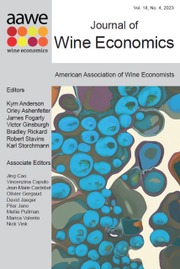Crossref Citations
This article has been cited by the following publications. This list is generated based on data provided by
Crossref.
Chavis, Larry
and
Leslie, Phillip
2009.
Consumer boycotts: The impact of the Iraq war on French wine sales in the U.S..
Quantitative Marketing and Economics,
Vol. 7,
Issue. 1,
p.
37.
Michaels, Guy
and
Zhi, Xiaojia
2010.
Freedom Fries.
American Economic Journal: Applied Economics,
Vol. 2,
Issue. 3,
p.
256.
Friberg, Richard
Paterson, Robert W.
and
Richardson, Andrew D.
2011.
Why is there a Home Bias? A Case Study of Wine.
Journal of Wine Economics,
Vol. 6,
Issue. 1,
p.
37.
Fisman, Raymond
Hamao, Yasushi
and
Wang, Yongxiang
2014.
Nationalism and Economic Exchange: Evidence from Shocks to Sino-Japanese Relations.
Review of Financial Studies,
Vol. 27,
Issue. 9,
p.
2626.
Yener, Dursun
2014.
Handbook of Research on Consumerism in Business and Marketing.
p.
458.
Clerides, Sofronis
Davis, Peter
and
Michis, Antonis
2015.
National Sentiment and Consumer Choice: The Iraq War and Sales of US Products in Arab Countries.
The Scandinavian Journal of Economics,
Vol. 117,
Issue. 3,
p.
829.
Cuadras-Morató, Xavier
and
Raya, Josep Maria
2016.
Boycott or Buycott?: Internal Politics and Consumer Choices.
The B.E. Journal of Economic Analysis & Policy,
Vol. 16,
Issue. 1,
p.
185.
Pandya, Sonal S.
and
Venkatesan, Rajkumar
2016.
French Roast: Consumer Response to International Conflict—Evidence from Supermarket Scanner Data.
Review of Economics and Statistics,
Vol. 98,
Issue. 1,
p.
42.
Zhi, Yan
Bao, Di
and
Luo, Changyuan
2017.
Economic Value of Country Image: Evidence from International Trade and Implications for China.
China & World Economy,
Vol. 25,
Issue. 3,
p.
87.
Fox, Stephen
Kauttio, Janne
Mubarak, Yusuf
and
Niemisto, Hannu
2017.
Determinants in Competition between Cross-Sector Alliances.
Administrative Sciences,
Vol. 7,
Issue. 3,
p.
31.
Yener, Dursun
2017.
Socio-Economic Perspectives on Consumer Engagement and Buying Behavior.
p.
22.
Hendel, Igal
Lach, Saul
and
Spiegel, Yossi
2017.
Consumers' activism: the cottage cheese boycott.
The RAND Journal of Economics,
Vol. 48,
Issue. 4,
p.
972.
Wang, Zhongmin
Lee, Alvin
and
Polonsky, Michael
2018.
Egregiousness and Boycott Intensity: Evidence from the BP Deepwater Horizon Oil Spill.
Management Science,
Vol. 64,
Issue. 1,
p.
149.
Castelló, Enric
and
Mihelj, Sabina
2018.
Selling and consuming the nation: Understanding consumer nationalism.
Journal of Consumer Culture,
Vol. 18,
Issue. 4,
p.
558.
Ferguson, Benjamin
and
Ostmann, Florian
2018.
SWEATSHOPS AND CONSUMER CHOICES.
Economics and Philosophy,
Vol. 34,
Issue. 3,
p.
295.
Livat, Florine
2019.
The Palgrave Handbook of Wine Industry Economics.
p.
463.
Watanabe, Nicholas M.
Yan, Grace
and
Soebbing, Brian P.
2019.
Market disruption as a regime for athlete activism: An economic analysis of college football player protests.
Sport Management Review,
Vol. 22,
Issue. 5,
p.
600.
Antonetti, Paolo
Manika, Danae
and
Katsikeas, Constantine
2019.
Why consumer animosity reduces product quality perceptions: The role of extreme emotions in international crises.
International Business Review,
Vol. 28,
Issue. 4,
p.
739.
Korovkin, Vasily
and
Makarin, Alexey
2019.
Trading with the Enemy: The Impact of Conflict on Trade in Non-Conflict Areas.
SSRN Electronic Journal ,
Koenig, Pamina
and
Poncet, Sandra
2019.
Social responsibility scandals and trade.
World Development,
Vol. 124,
Issue. ,
p.
104640.




